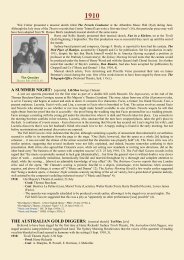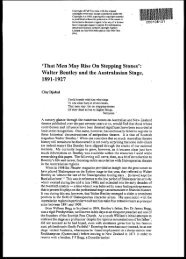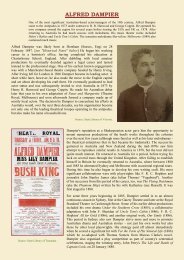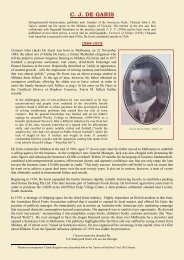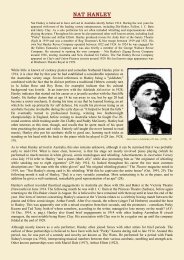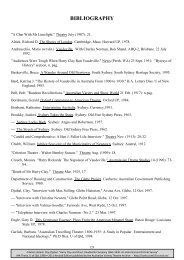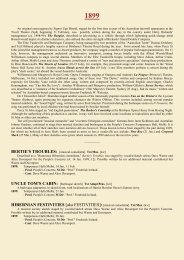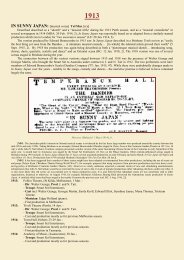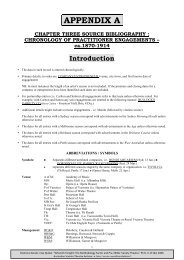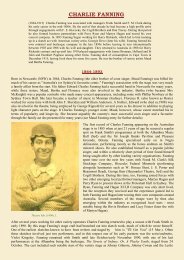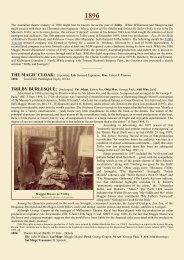GEORGE WALLACE - Australian Variety Theatre Archive
GEORGE WALLACE - Australian Variety Theatre Archive
GEORGE WALLACE - Australian Variety Theatre Archive
Create successful ePaper yourself
Turn your PDF publications into a flip-book with our unique Google optimized e-Paper software.
1919-1923<br />
After having developed a solo and double act (with his wife) that he believed had potential, Wallace decided in late 1918 to move<br />
to Sydney to take advantage of the work opportunities that the city's much expanded industry had to offer. Shortly after his arrival,<br />
he was given a start on Harry Clay's suburban circuit, having impressed the management with his acrobatic clog-dancing. His<br />
initial salary was £4 a week. Brodie Mack, for many years the Fullers' booking agent, recalls the comedian's arrival in Sydney: 'I<br />
happened to be at Harry Clay's Newtown Bridge <strong>Theatre</strong> (it's now The Hub) looking for new acts. It was his trial appearance, and<br />
he was appearing for nothing. He stopped the show. His acrobatic dance had them rolling in the aisles. Harry wasn't in the theatre<br />
to see it; he asked me afterwards how the new man went. "Don't let him get away," I replied. "You have a real comedian there"<br />
(SMH: 23 Oct. 1960, 57).<br />
Wallace quickly became a crowd favourite as a solo performer. The husband/wife act struggled somewhat during the first few<br />
months, however, with several reviews from early 1919 indicating that the act had limited appeal. An <strong>Australian</strong> <strong>Variety</strong> critic, for<br />
example, simply says, "The Two Wallaces - very inexperienced, bad routine and mixed up turn" (24 Jan. 1919, n. pag.). However,<br />
the <strong>Theatre</strong> critic found things on the improve a few months later, writing:<br />
Princess <strong>Theatre</strong>, 8-15th March: George Wallace is a comedian with a delightfully quiet style. He gets his laughs without any<br />
forcing. His wife helps him in the patter. They wind up by introducing their son, a tiny mite, in one clever acrobatic pose<br />
(Apr. 1919, p.28).<br />
Although the double act did not last much longer under the close scrutiny of Harry Clay's management, Wee Georgie Wallace<br />
continued to made semi-regular appearances on the stage with his dad over the next five or so years, including feature spots with<br />
Dinks and Oncus.<br />
As with many of Clay's other contracted performers, Wallace often appeared in revusicals, with these being presented as the<br />
second half of an entertainment bill at most of his venues. The one-act musical comedy was the most popular of all the variety<br />
theatre genres being staged in Australia during that era, and a number of Clay's leading artists had, since 1915, been given the task<br />
of writing and staging their own productions. This experience provided Wallace with the necessary training to eventually become<br />
one of Australia's most popular revusical practitioners. One of the earliest productions he appeared in, A Fireman's Troubles by<br />
Joe Rox, led the <strong>Theatre</strong> magazine to write of Wallace's performance that "George Wallace is a comedian with a delightfully quiet<br />
style. He gets his laughs without any forcing... Chief honours are annexed by Wallace in a clever Johnny study and by Billy Cass<br />
and Joe Rox as two impossible firemen" (Apr. 1919, 28).<br />
Dinks and Oncus<br />
<strong>Australian</strong> Women's Weekly 30 June (1971), 13.<br />
His value as a performer even during these early days on the Clay circuit was due<br />
in part to his versatility, an aspect that factored largely in his success throughout<br />
his career. In June 1919, for example, the <strong>Theatre</strong> described Wallace's "clever<br />
clog-dancing as... reminiscent of the days of Dan Tracey" (25). By the end of the<br />
year, the same magazine said of his act that "His female impersonations have the<br />
house in shrieks all the time he's on the stage" (Jan. 1920, 26). Wallace was also<br />
beginning to attract the attention of <strong>Australian</strong> <strong>Variety</strong>, which records in<br />
December that "[He] is gaining applause for his smart dancing and good comic<br />
songs [and] since his opening... has made rapid strides towards success" (11 Dec.<br />
1919, n. pag.).<br />
A little over a year after joining Harry Clay's organisation, George Wallace's<br />
career reached new heights when he joined forces with comedian Jack "Dinks"<br />
Paterson to form Dinks and Oncus, an act that Katherine Brisbane notes had no<br />
equal in being so well remembered purely from appearances on Clay's circuit<br />
(179). In an interview conducted shortly after Wallace's death in 1960, Paterson<br />
recalls how the partnership started: "It began in the park opposite the old Opera<br />
House (now the Tivoli). George and I, both of us under contract to Harry Clay's<br />
suburban vaudeville circuit, were watching the crowds pack in to see Stiffy and<br />
Mo when George said suddenly, 'There's the opportunity for us. Why don't we<br />
team up and become a double act, too?' We finally got the old man to give us a try.<br />
George and I never looked back'" (SMH: 23 Oct. 1960, 57).<br />
[For details regarding George Wallace's career between 1920 and 1923 see the Dinks and Oncus entry]<br />
1924-1928<br />
George Wallace is believed to have left Harry Clay's management not long after he and Jack Paterson ended their Dinks and<br />
Oncus partnership in late 1923. He was subsequently offered a contract by the Fullers sometime around January 1924. Ben A.<br />
Fuller, son of Sir Benjamin, recalls the night his father sent him to the Bridge <strong>Theatre</strong> to ascertain Wallace's prospects as a<br />
possible Fullers' comedian:<br />
We needed a show in a hurry for Dunedin [New Zealand]. My father told me, "I think that young fellow Wallace out at<br />
Newtown would go over for us. Go and have a look at him tonight." It was a Monday night but the theatre was packed - that's<br />
how popular George was. I sat in the centre stalls with Brodie Mack, when suddenly part of the stage went up in flames. One



